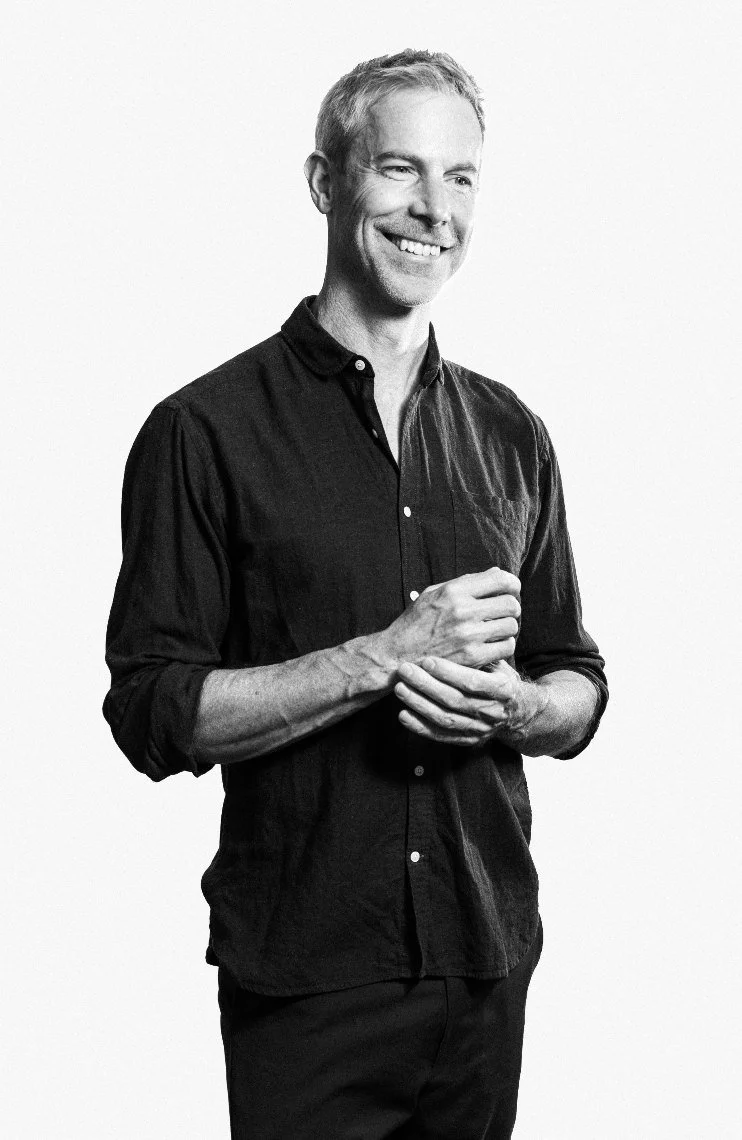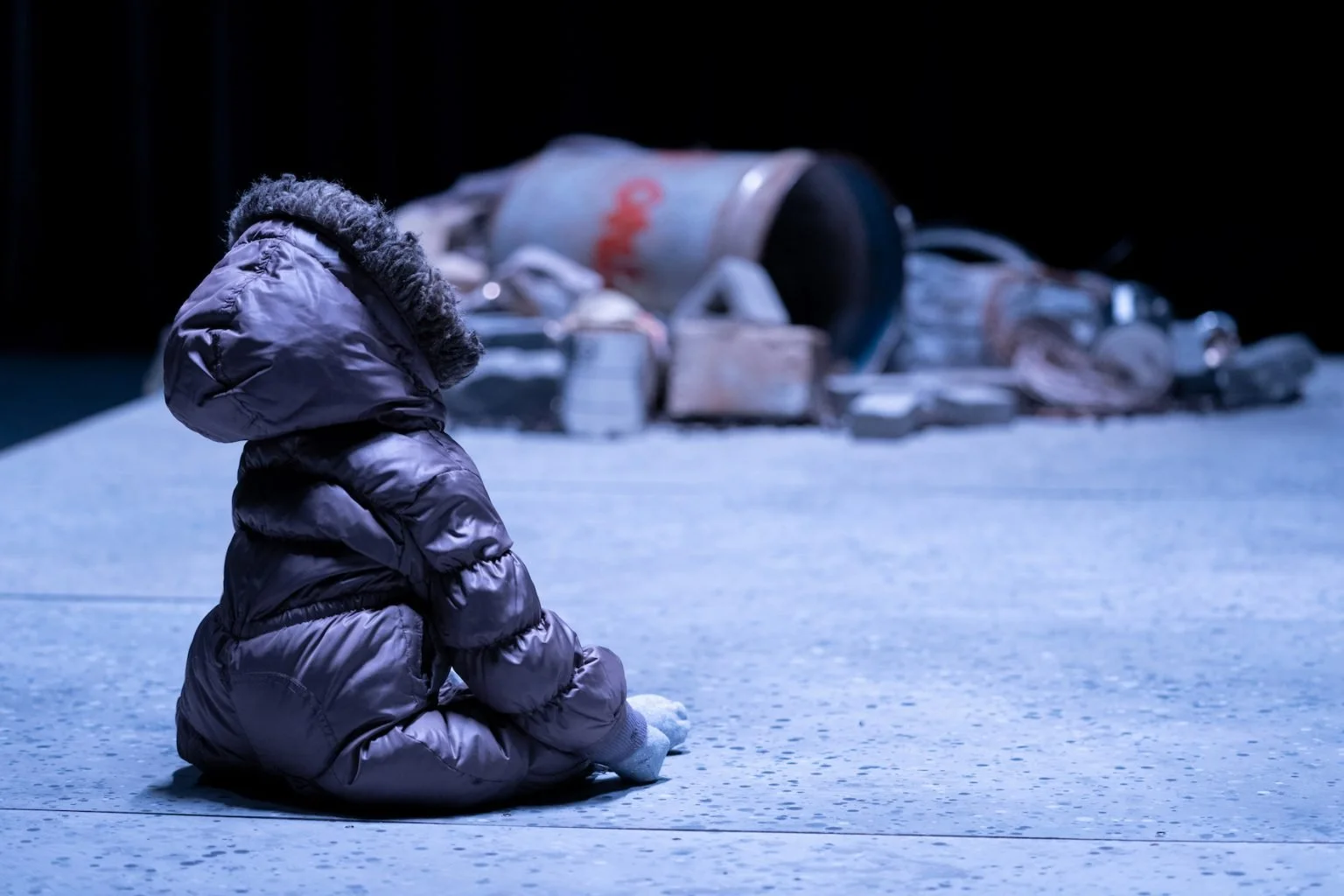In An Undeveloped Sound, Jonathon Young explores language, existence, and the wider meaning of "development"
Inspired by the myth of Faust, the writer-playwright’s new work features a team of spokespeople representing a mysterious “developer”
Jonathon Young
An Undeveloped Sound with Amy Rutherford. Photo by David Cooper
Electric Company Theatre, SFU Woodward’s Cultural Programs, and the PuSh International Performing Arts Festival present An Undeveloped Sound from January 30 to February 11
IN VANCOUVER, WHERE real estate has skyrocketed and a housing crisis rages on, the word “developer” carries instant connotations.
But in his new Electric Company Theatre work, An Undeveloped Sound, writer-director Jonathon Young plays with its meaning, expands it, and pushes it into metaphorical and existential new realms.
It’s a word that comes up again and again in his conversation with Stir over coffee, just before heading into SFU Woodward’s Fei and Milton Wong Experimental Theatre for final rehearsals for the interdisciplinary theatre work inspired by Goethe’s dramatic poem Faust.
“The word real estate is not in the play,” he emphasizes. “I’m aware of the connotations and the currency of that word—developer—but for me, Faust is a developer, Mephistopheles is a developer. Interestingly, Faust’s last exploit in the poem is setting his sights on a coastline, and his last quest is to develop it. He wants to beat back the ocean from this stretch of land—he wants to conquer the ocean, to build this massive system of dikes and walls and dams so that he can liberate this coastline where he wants to build a kind of utopia.
“So maybe that’s where this idea of ‘developer’ came from: without some wager with forces of destruction, one can’t develop.”
Featuring top-flight actors Ryan Beil, Andrew McNee, Amy Rutherford, and Laara Sadiq, An Undeveloped Sound takes place on the shores of an ocean in an abandoned commercial outlet, where a team of spokespeople has to manage the messaging for a mysterious new “development”. But there’s a problem: units have been sold but aren’t materializing. What exactly have they been hired to represent, are they being scammed, and is it even possible to get out of here?
“We do have a developer in our show, a very mysterious individual, and who or what is the developer is the essential question,” Young hints. We’ll leave the appearance of that character he refers to as “Little One” a surprise; suffice it to say the fascinating figure is a mix of the sinister and child-like innocence.
Anyone familiar with the artist’s creations for Electric Company Theatre and longtime collaborator Crystal Pite knows how brilliantly Young explores language. In Kidd Pivot’s Revisor, the title referred not just to the lead character’s bureaucratic role, but to the constant revising of the story—and the century of revisions of the Nikolai Gogol play that inspired it. In The Statement, created with Pite for Nederlands Dans Theatre and staged here by Ballet BC last year, dancers physicalized elliptical office speak, heard in voice-over by actors, frantically trying to craft a “statement” about a “situation” for the people “upstairs”.
“It’s certainly a preoccupation of mine,” Young says of language. “When we are forced to communicate—especially about who we are and what makes us work and what we want—I always feel like language gets me just so far in that exchange and then ends up being a misrepresentation. I’ve always looked back on things I’ve said and thought, ‘That missed the mark.’”
Backing up for a minute: Though it explores some of the same themes Young has dug into over the years, creating An Undeveloped Sound over the last few years has been a bit of a unique process for him. Dating back to his exciting early days of Electric Company Theatre, he worked collaboratively on scripts like Tear the Curtain!, and he’s always either directed or else written work separately. This is the first time he’s ever written and directed a piece on his own.
“With this one I wanted to find out what would develop if I was left to my own devices,” he says—acknowledging that it has grown into a much more elaborate collaborative process in the studio.
An Undeveloped Sound all started with the Faustian legend. At first, Young explored the myth as he knew it from Christopher Marlowe’s Elizabethan tragedy Doctor Faustus. But it was taking a deep dive into Johann Wolfgang von Goethe’s early-19th-century play that really fascinated him.
Whereas Marlowe’s rendition created a deadline for Faust’s pact with Mephistopheles, and set a time limit to take the titular character’s soul, Goethe’s play creates a more ambiguous wager. “Faust bets the Devil ‘If you give me access to total experience, to whatever knowledge or whatever highs and lows I want to experience, I will bet you that you’ll never tempt me to the point where I’ll say “I’ve got what I came for and I’m satisfied and here I’ll stay here forever.”’”
That endless dance between Faust striving for knowledge and Mephistopheles negation appealed to Young: the idea of reaching toward something one can never achieve.
“Nothing develops without that desire to achieve something, and then there’s the Mephistophelean force of it always being snatched and dissolving,” he says. “There’s a portrait of life itself in that: the elemental forces of development and destruction. And the Devil in that sense really is a necessary evil.”
An Undeveloped Sound has grown into its own, separate vision—Young describing Goethe’s original text as a kind of “subconscious map” for his new play.
Over several technical residencies and workshops, the piece was built from its early stages with technical and design elements (carrying through ECT’s longtime aim of theatrical spectacle and adventurous form). Amid the crack team, dance artist Natalie LeFebvre Gnam has created movement direction, stage designer Camellia Koo has built the scenography, Eric Chad and Jack Chipman have conjured the projected media design, and electro-ambient musician Loscil has composed the score. Vancouver playwright Marcus Youssef worked with Young in dramaturgical support.
Young describes the look as “steeped in a kind of commercial or advertising world”, with hints of signage throughout.
Speaking to Young, it’s clear that this ambitious project also wrestles with the role of the artist, and bigger questions of the universe—such as whether there’s a bigger Developer somewhere out there.
“We as creatures of expression are obviously an outlet of something, some mixture of forces–obviously we’re speaking on behalf of some kind of ‘development’,” he says. “A creative outlet called a theatre, a play: how does it operate or speak about the bottomless questions about existence that we can summarize in a word, in a sentence, in a poem, or a paragraph, or an encyclopedia? And every time you get to that point in a play, it’s at that point it immediately starts to fail in front of your eyes and disintegrate.
“So I would say the internal forces of futility and hope are the central tension of this piece,” he says, “driving it forward. Developing it.”
The “Little One” in An Undeveloped Sound. Photo by David Cooper
















